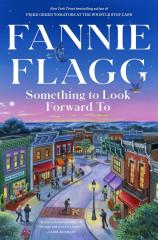Something to Look Forward To: Fictions
Review
Something to Look Forward To: Fictions
Since the 1980s, America has had a poet laureate. Why don’t we have a fiction laureate? I nominate Fannie Flagg.
No one gets to the heart of the American spirit more effectively, or more charmingly, than Flagg. Her novels and stories are always filled with kind citizens helping out neighbors and strangers alike --- whether it’s FRIED GREEN TOMATOES AT THE WHISTLE STOP CAFÉ, where Idgie rescues her best friend Ruth from an abusive husband, or stunt pilot Fritzi from THE ALL-GIRL FILLING STATION’S LAST REUNION, who, during World War II, returns to her family’s filling station with a bold new plan to keep it afloat. Flagg’s characters humorously remind us of our better selves. In her latest outing, SOMETHING TO LOOK FORWARD TO, that’s not just a title --- it’s a pronouncement.
This short story collection is framed by the author herself, letting the reader know what a fan of humanity she is and thanking them for being so interesting to observe. But we have another observer of humanity, and that’s Special Agent William Frawley, named after the actor who portrayed Fred Mertz on “I Love Lucy.” Frawley has been given a directive from his fellow alien bosses, who are perplexed as to why humans go around all day looking at their hands constantly. So Frawley departs his home planet 8676 to find out why. His boss remarks, “I don’t understand. If everything on Earth is as beautiful and wonderful as you say, then why are the humans not enjoying it more?” One of the first things Frawley discovers is that they’re looking at their phones, but that’s just the tip of the human iceberg he witnesses.
"SOMETHING TO LOOK FORWARD TO is truly that --- a cheerful, joyful remembrance of what binds us together, and what threatens to tear us apart."
Through this framing device, Flagg introduces us to a cavalcade of characters all over the country and in different time periods. Among them is Sally Gordon, a 48-year-old local anchorwoman who wonders how her life would be different after attending the funeral of a former boyfriend (if only she had gone to the right funeral!). We also meet Helen, a housewife whose husband of 40 years has just left her for his younger secretary. But Helen has a hard time letting go and watching him start a new life: “The stark reality of what was being said began to hit her, and she almost couldn’t breathe. He was already using the word 'we' and was planning the future that she had planned, only without her.”
Mrs. Marion Thornton Smith of Birmingham, Alabama, finds herself faced with the dreaded “D” word: downsizing. After spending a lifetime with her late husband, carefully curating her home and furnishings, her accountant informs her that she can’t afford to continue running this stately house. She must face reality and sell her beloved home: “Marion had never understood why people were always so keen on facing reality. She didn’t care much for reality, she never had. She preferred her own reality, where everything was beautiful, everyone well-mannered and soft-spoken. She did not want to face the cold, hard, cruel facts of life. But the thing she had always avoided was now standing before her and staring her right in the face.”
Marion suffers the indignities of crass real estate agents and stagers, who constantly deride her classic antiques and insist that she must clear it all out before they can stage it because prospective buyers “are all looking for something a little more spacious and open with less, well, clutter…. After the realtor left, Marion almost cried. Four generations of loving and caring for your lovely family things, and this Marie person thinks it’s clutter.” You’ll never attend an open house again without thinking of the family history within the place and to keep catty comments to yourself.
We get several stories about young mother Cathy and her feisty grandmother, Velma of Cottonwood Springs, Kansas, who cannot understand why her granddaughter prefers to raise her child in California over the fresh air and open skies of Kansas.
What will Frawley make of all these different humans and their varied experiences? What will his report to his alien superiors reflect about the human race? He thinks part of their problem is their need to differentiate themselves from others: “...humans are very complicated creatures…. I believe that most of their troubles are caused by the fact that although humans are all the same species, they seem to want to separate into smaller groups. It appears to make them feel more safe and comfortable to be with other humans who think like they do and look like they do.” Frawley’s boss wonders if humans are even worth observing anymore. Are they worth saving? Frawley has some recommendations for him and some sage advice for us humans. Now we just have to heed it.
SOMETHING TO LOOK FORWARD TO is truly that --- a cheerful, joyful remembrance of what binds us together, and what threatens to tear us apart. Thankfully, in the seasoned hands of Fannie Flagg, we see that, despite our follies and foibles, we just keep on going. We’re nothing if not constant. Thank goodness for that.
Reviewed by Bronwyn Miller on August 22, 2025
Something to Look Forward To: Fictions
- Publication Date: August 19, 2025
- Genres: Fiction, Short Stories
- Hardcover: 288 pages
- Publisher: Random House
- ISBN-10: 0593734416
- ISBN-13: 9780593734414




